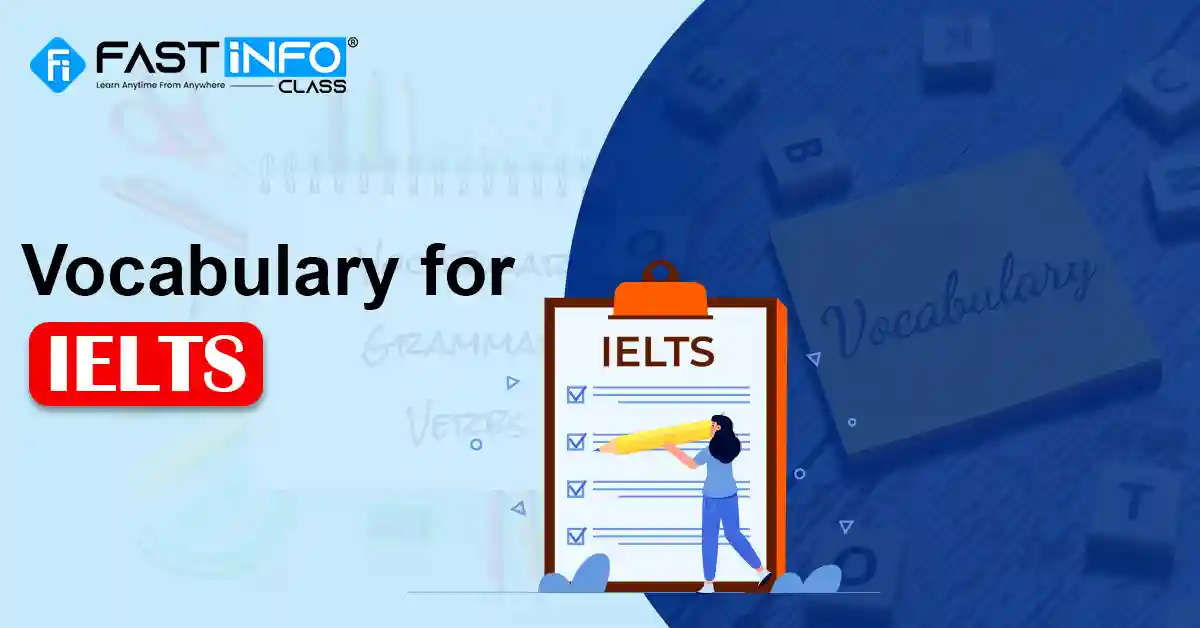Self Introduction in English for Job Interviews: A Guide
29 Dec, 2025
Welcome Offer for First Time Customers Get 15% off USE CODE: NEW15 AT CHECKOUT

Welcome Offer for First Time Customers Get 15% off USE CODE: NEW15 AT CHECKOUT

Welcome Offer for First Time Customers Get 15% off USE CODE: NEW15 AT CHECKOUT

Welcome Offer for First Time Customers Get 15% off USE CODE: NEW15 AT CHECKOUT

Welcome Offer for First Time Customers Get 15% off USE CODE: NEW15 AT CHECKOUT

Welcome Offer for First Time Customers Get 15% off USE CODE: NEW15 AT CHECKOUT

Welcome Offer for First Time Customers Get 15% off USE CODE: NEW15 AT CHECKOUT

Welcome Offer for First Time Customers Get 15% off USE CODE: NEW15 AT CHECKOUT


 By FastInfo Class
Published On 30 Aug 2025
Updated On 01 Sep 2025
Category IELTS
By FastInfo Class
Published On 30 Aug 2025
Updated On 01 Sep 2025
Category IELTS
Many students consider the IELTS exam challenging, particularly when it comes to writing and spoken English. Strong writing skills help to express ideas clearly. On the other hand, speaking confidently helps to improve performance in speaking. Enhancing both skills simultaneously improves exam scores and helps to build confidence in everyday communication. Every student must understand the simple and effective strategies to improve their IELTS writing and spoken English. Practical tips and techniques help to achieve good results in the exam. In this blog, you will learn how to improve your English for IELTS writing.
The IELTS Writing test measures the ability to express ideas clearly in written English. The exam evaluates how thoughts are organised and presented logically. The test also assesses the use of suitable vocabulary, smooth linking of sentences, and accurate grammar to communicate effectively.
The IELTS Writing test consists of two main tasks, and each focuses on different writing abilities:
Task 1 (Academic) needs candidates to describe, summarise, or explain information that is shown in graphs, charts, tables, or diagrams. This task specifies key features and trends in the data. It allows candidates to show the ability to select important points, organise them logically, and present them. This task tests how well the candidate can interpret information and write in a structured and precise manner. This task measures the skill of a candidate to interpret information and write in a structured and accurate manner.
In Task 1 (General Training), candidates write a letter about a provided situation or topic. As a candidate, you can write a formal, semi-formal, or informal letter. You are required to use your communication ability for the given situation. This task contains the writing structure, tone, and clarity. It also contains the skill to share information or request simply and correctly.
Candidates are required to write an essay related to a question or argument in Task 2, which contains both academic and general training. It allows candidates to present an opinion with valid reasons and examples, and discuss other viewpoints if required. The task helps to test the ability to compare ideas, write arguments, along with analysing evidence in a logical manner. Candidates should always focus, organise paragraphs well, and use correct vocabulary and grammar. Institutes such as FastInfo Class train candidates to build strong essay structures and develop arguments effectively.
Each task has a specific scoring system. The overall score depends on task achievement, the clarity of ideas, logical organisation, appropriate vocabulary, and correct grammar. Success in the IELTS Writing test shows strong writing skills and is important for those planning to study, work, or live in English-speaking countries.
Listed below are the Importance of IELTS Writing:
IELTS Writing tests are considered important skills. It includes understanding data, summarising information, creating arguments, and analysing issues. These skills are useful for the exam and real-life situations. It plays a crucial role in preparing academic reports, drafting business presentations, and communicating effectively in professional settings. As a candidate, if you can write with clarity and purposefully, it can help you to make effective decisions and present ideas properly.
Strong writing skills help to increase your chances of getting admission to reputed universities, securing scholarships, making a strong impression in job applications, and more. Institutes like FastInfo Class offers specialised IELTS coaching that strengthens writing skills for academic and professional success. Clear and well-structured writing reflects on your maturity, logical thinking, and skills to present ideas effectively. These qualities also make writing a key factor in achieving long-term goals.
As a candidate, if you have good writing skills, you can maintain your complex information and present it in a clear format. It also helps to:
Such skills prove useful in the workplace, in academic environments, and in any situation where communication must be clear and convincing.
Many students may find the writing section of IELTS harder compared to reading or listening. Writing requires original thought, proper structure, accurate grammar, and suitable vocabulary. They feel it is challenging due to its balance of creativity and precision. A test-taker should understand the pattern of sharing ideas with several sentence structures, proper tense, and maintaining accuracy in spelling and punctuation.
Scoring well in IELTS Writing depends on understanding the marking criteria. As a candidate, you must know how to answer the question, logically arrange ideas, use a wide range of vocabulary, and apply grammar correctly. Many people believe that good spoken English helps to build success, and you need to follow a proper structure and presentation to score high. A clear understanding of the examiner’s expectations helps to focus effort in the right direction and achieve better results.
However, you can enrol in trusted institutes such as FastInfo Class to strengthen your skills through structured practice and expert feedback from its trainers.
Here is the role of Spoken English in IELTS Exam:
The IELTS Speaking test focuses on spoken English skills rather than academic writing. The aim is to check how naturally and clearly a person can communicate in everyday situations. Even in the Academic version of IELTS, using stiff or essay-like language can lower your score. Examiners expect a conversational style that sounds natural, clear, and easy to follow. Speaking in a relaxed and confident tone helps create a better impression than using overly formal words.
The Speaking test follows a real conversation format. It takes place face-to-face or through a video call with a certified examiner. The discussion starts with general topics, moves to a short individual talk, and ends with an extended discussion. The test lasts 11 to 14 minutes and is divided into three parts. This structure allows the examiner to check how well you communicate across different types of interactions.
Performance in the IELTS Speaking section is judged on four areas:
These four areas together give the examiner a complete picture of your spoken English skills.
IELTS Speaking is not about using complicated or rare words. The main goal is to be clear, engaging, and easy to understand. Just like in real-life conversations, your tone, choice of words, and ability to connect with the listener matter more than sounding overly academic. The test rewards natural and confident communication.
The Speaking test checks how well you can think and speak on the spot, especially when faced with new or unexpected topics. In Part 2, for example, you receive one minute to prepare a short talk of one to two minutes. This part tests your ability to organise ideas quickly and present them in a logical, connected way without losing clarity. As a student, you can join expert-led sessions at FastInfo Class to practise spoken English in real-life conversation styles.
Listed below are the common challenges in IELTS Writing and Speaking:
The IELTS Speaking test focuses on your ability to use spoken English effectively in real-life situations, not on academic writing. The aim is to check how naturally and clearly you can express yourself in everyday communication. Even in the Academic version, using very stiff or essay-like language can lower your score. Examiners expect a conversational style that feels natural, clear, and easy to follow. Speaking in a confident and relaxed tone helps you create a better impression than using unnecessarily formal or complex words.
This section follows the style of a natural conversation. It is conducted face-to-face or via video call with a certified examiner. The test starts with general questions, then moves to a short individual talk, and ends with an in-depth discussion. The whole process lasts between 11 and 14 minutes and is divided into three parts. This structure allows the examiner to see how well you handle different types of communication.
Your performance is marked based on four equally weighted factors:
IELTS Speaking is not about showing off with rare words. The goal is to be clear, natural, and engaging. Your tone, vocabulary choice, and ability to connect with the listener matter more than sounding overly formal.
The test also checks how quickly you can think and speak on new topics. In Part 2, you get one minute to prepare and then speak for up to two minutes. This tests your ability to plan, organise, and present ideas clearly under time pressure.
Here are the effective strategies to improve IELTS writing and Speaking:
Spend the first three to five minutes planning your answer. Start with a clear structure that includes an introduction, body paragraphs, and a conclusion. Each body paragraph should focus on one main idea supported with examples or explanations. A well-organised plan helps maintain a smooth flow of ideas and ensures you cover all parts of the question without going off-topic.
Follow the recommended time limits for each task. Allocate about 20 minutes for Task 1 and 40 minutes for Task 2. Use the first few minutes to plan, the majority of the time to write, and reserve a few minutes at the end to check your work for errors. Managing time effectively ensures you complete both tasks without rushing or leaving answers unfinished.
Build a collection of vocabulary related to common IELTS topics like environment, education, technology, and health. Use synonyms to avoid repeating the same words and include topic-specific terms to make your writing richer and more precise. Purposeful vocabulary use shows range and accuracy, which can boost your lexical resource score.
When writing your introduction, express the task prompt in your own words instead of repeating it exactly. Paraphrasing shows that you understand the question and can communicate the same idea in different ways. It also helps avoid any impression of copied content.
Link your sentences and ideas with transition words such as “Firstly,” “Moreover,” “However,” and “In conclusion.” Using these connectors appropriately improves coherence and makes your essay easier to follow.
Use both simple and complex sentences to show a range of grammar skills. Include structures like modals and conditionals where suitable, but focus on accuracy. Clear and correct sentences create a stronger impact than overly complicated ones with mistakes.
Write regularly under exam-like conditions to build speed and confidence. Study high-scoring sample essays to understand effective techniques. Seek feedback from teachers, mentors, or online tools to identify mistakes and improve your performance over time.
Conclusion
Mastering both IELTS writing and spoken English is essential for achieving a high band score in the IELTS exam. Strong writing skills help express ideas clearly and effectively. Good spoken English improves fluency and confidence in communication. When both skills grow together, performance in the test improves. With regular practice and smart strategies, language skills can reach new heights. This progress opens doors to education, career growth, and global opportunities.
If you want expert guidance and reliable resources to excel in IELTS, contact FastInfo Class. They offer expert IELTS courses to boost your English skills.
FAQ
Q1. What is the IELTS writing test format in 2025?
In 2025, the IELTS writing test includes two tasks: Task 1 (describing visual data or a letter) and Task 2 (an essay). The format remains the same for both paper-based and computer-delivered tests.
Q2. How important is spoken English for the IELTS exam?
Spoken English is vital for the speaking section, where fluency, pronunciation, grammar, and vocabulary are assessed. It also supports better performance in listening and writing tasks.
Q3. What are the common challenges in IELTS writing and speaking?
Common challenges include limited vocabulary, grammar errors, poor time management, difficulty in structuring answers, and lack of speech fluency.
Q4. How can IELTS writing and speaking be improved together?
Improvement comes through regular practice, learning topic-specific vocabulary, recording and reviewing speech, and writing essays on similar themes to build language consistency.
Q5. Can professional coaching help in achieving a higher IELTS band score?
Yes. Professional coaching offers expert guidance, personalised feedback, and proven strategies to strengthen both writing and speaking skills for better results.

Self Introduction in English for Job Interviews: A Guide
29 Dec, 2025

10 Effective Ways to Improve IELTS Vocabulary
05 Dec, 2025

Common IELTS Speaking Topics & Questions for 2025-2026
02 Dec, 2025

Common Idioms and Phrases for IELTS
02 Dec, 2025

Best Conversation Topics In English For Daily Use
02 Dec, 2025

Daily English Conversation Practice for Beginners: 50 Useful Topics
29 Jun, 2023

Must Read Novels to Improve English for Beginners to Advanced
21 Feb, 2023

Top 15 Spoken English Books to Enhance Your Fluency
09 Sep, 2023

English Speaking Course for Beginners - Everything you must know
22 Sep, 2021

25 Commonly Mispronounced English Words in India
26 Apr, 2024